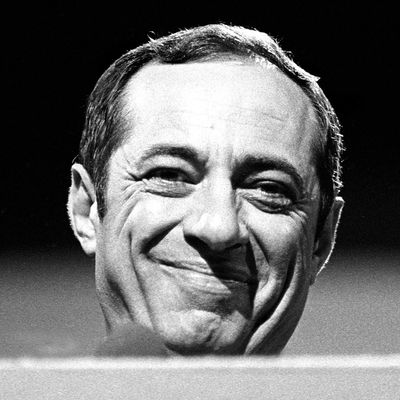
Mario Cuomo, the former governor of New York, died today at the age of 82. New York Magazine political columnist Chris Smith remembers his career.
I’ve forgotten what the yelling was about. But it was loud, and intense. Days earlier I’d been hired as the assistant to Joe Klein, New York Magazine’s political columnist. Now I could hear Joe shouting from down the hall — “Oh, bullshit!” — and as I got closer to his office, I could hear that the person on the other end was yelling back just as loud, though I couldn’t identify the voice. I waited, nervously, until things had gone quiet for a few minutes before entering Joe’s office. What happened? “Oh,” he said with a giant smile. “It was just Mario.”
Mario Cuomo. The governor. This was 1988, and Cuomo was a huge political star. He’d been elected six years earlier and put together a successful first term in Albany, balancing the state’s budget while expanding New York’s social programs. Then, in 1984, Cuomo became a national figure and a liberal hero by delivering two classic speeches: “Religious Belief and Public Morality,” at Notre Dame, explaining how a devoutly Catholic governor could uphold the nation’s abortion laws, and the keynote address at the Democratic National Convention, in San Francisco, a stinging progressive rebuke to Ronald Reagan’s vision of America. “There is despair, Mr. President,” Cuomo said, “in the faces that you don’t see, in the places that you don’t visit, in your shining city.”
Running through all of it wasn’t just Cuomo’s towering intellect and his gift for lyrical phrasing. There was his burning passion, the quality that pushed Cuomo from his first-generation Italian immigrants parents’ grocery store in Queens to law school to mediating an ugly dispute over low-income housing. The quality that drove him from losing an epic and ugly mayoral race against Ed Koch in 1977 to beating Koch in a nearly-as-bitter rematch for governor in 1982. The same heat and heart that had him screaming through the phone at reporters. (That passion and love of debate also informed some brilliant writing: Go read Klein’s “The Devil and Mario Cuomo” after you finish reading this.)
It was unknowable at the time, but 1988 would basically turn out to be Mario Cuomo’s peak. He’d been reelected governor in a landslide, and now, halfway through his second term, Cuomo was an early favorite to become the Democratic presidential nominee. But he passed and watched as Michael Dukakis got demolished by George H.W. Bush. Surely, then, Cuomo would run in 1992, with the country in a recession and Bush a highly vulnerable incumbent.
He didn’t, of course, and the way Cuomo opted out became a debacle that corroded the rest of his political career. He spent much of 1991 weighing a campaign publicly, earning the nickname “Hamlet on the Hudson.” A chartered plane, idling on a tarmac, waiting to carry him to New Hampshire at the last minute to file primary petitions, became the indelible image of Cuomo’s indecision.
He won a third term as governor but was beaten in 1994 by George Pataki, who emphasized how the state’s taxes and bureaucracy had ballooned during 12 years of Cuomo. For all of Cuomo’s real failings as a manager of the government, however, it was his greatest strength, his earthy passion, that did him in politically. The humanity that fueled his greatest speeches — and was the foundation of his unshakable principles, like staunchly opposing the death penalty — was also what kept Cuomo from reaching higher. Cuomo was too familiar with his own flaws, and too scared that he might lose, to risk running for president. His humility became a kind of hubris, and a kind of paralysis.
There were some humorous side effects to Cuomo’s tortured psyche, however. Political operatives and state legislators would hear their phones ring at 5 a.m. with a call from the governor’s mansion. They’d pick up and hear the voice of a state trooper on the other end, telling them Cuomo wanted to talk. “But the reason he had the trooper make the call was so he could say it wasn’t Mario Cuomo who woke the guy up in the middle of the night — it was the trooper,” said the man telling me the story, laughing.
That man is now the governor, and he was sworn in to a second term today. Andrew, the second oldest of Mario and Matilda Cuomo’s five children, has been influenced by his father more than most sons. “No one can truly understand how deep that goes,” says a Democrat who has worked with both Cuomos. For all the inspirational breadth of Mario Cuomo’s 82 years — from his minor-league baseball career to his heroic championing of immigrants to his enduringly literary diaries — perhaps his greatest legacy is that, through his very different and very similar son, he continues to shape New York’s progressive politics.
On the night of November 4 Andrew Cuomo had just been comfortably reelected to his own second term. In a midtown hotel ballroom he delivered a rousing victory speech, ending it by thanking the voters. A Tina Turner song started blaring. Then the governor shouted for the music to stop, and ordered the crowd to quiet down. “I have the honor to bring out the man who is the father of the modern Democratic Party, a man who is all about principle and inspiration,” he said. Out walked his father, looking frail. Andrew Cuomo took his father’s right hand and held it high in the air, for a long time, making sure that Mario Cuomo exited public life to cheers.





























